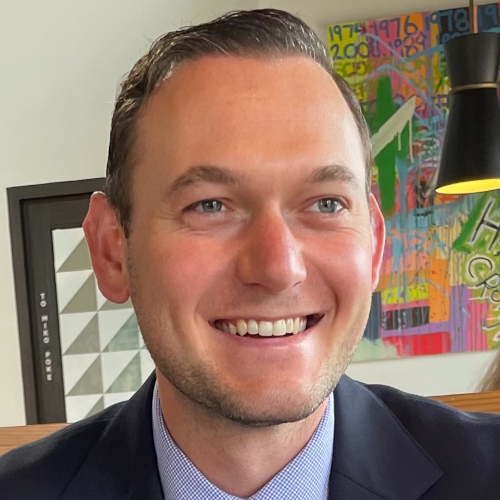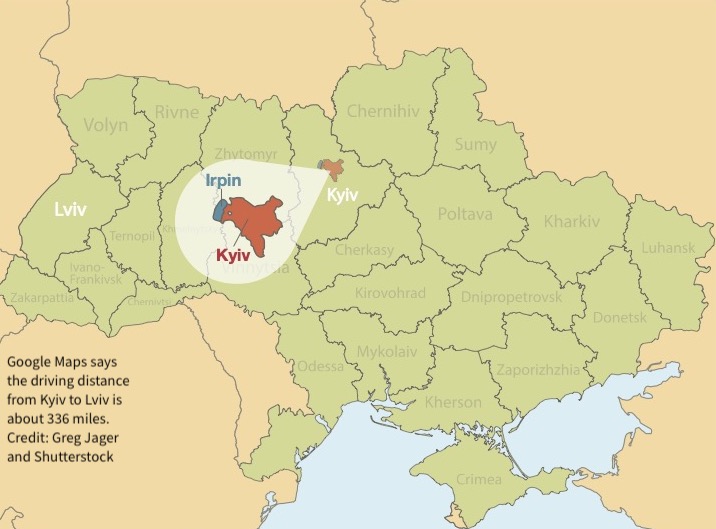Olin alum’s startup hires team to rescue Ukrainian programmer, parents in early days of war
- July 20, 2023
- By Kurt Greenbaum
- 7 minute read

With luggage in hand, a software developer based in Ukraine—working for a Chicago-based startup—fled with his parents through a Russian-occupied section of Irpin. They walked through a Russian checkpoint and over a makeshift platform at the Irpin River that substituted for a blown-up bridge.
Five thousand miles away in Chicago, in March 2022, Kyle Bank, BSBA 2014, anxiously awaited word as his colleague from Phenix Real Time Solutions escaped missiles and mortar fire in the wake of Russia’s campaign of aggression against Ukraine.

“Getting out of Irpin was probably the most dangerous part,” said the programmer, who asked to remain unnamed. “We packed our things into suitcases. We had to walk through Russian-occupied territory. We had to walk fairly quickly.”
Since 2015, the programmer had worked out of his home in Ukraine’s capital city of Kyiv for Phenix, where Bank was the chief operating officer. He’d been visiting his parents in the suburb of Irpin when, on February 24, 2022, the missiles began to fly. Russia’s invasion began. Electricity and water failed. Air raid sirens screamed.
Twelve days later, he began the perilous journey with his parents—thanks, in part, to a decision by the Phenix management team back in Chicago. The company spent thousands of dollars to hire an extraction team to move the programmer and his parents from Kyiv to the relative safety of Lviv in western Ukraine.
“It didn’t take any convincing of our CEO or our founder,” Bank said. “Same with our board of directors. Not one word of hesitation.”
Startup newcomers
Bank originally joined Phenix in 2016 as its business development director, helping the startup with a focus on software to improve live video streaming. Phenix wanted to address the delay, or latency, that often occurs between the time a camera picks up an image and the time a viewer sees it.
 For example, they wanted viewers of a baseball game to see a base hit fractions of a second after the crack of the bat rather than 60 or 90 seconds later. They wanted real-time video to mean what it says. When Bank joined, Phenix had one customer and seven employees.
For example, they wanted viewers of a baseball game to see a base hit fractions of a second after the crack of the bat rather than 60 or 90 seconds later. They wanted real-time video to mean what it says. When Bank joined, Phenix had one customer and seven employees.
One of them was the Ukraine-based software developer. The company had found him through an outsourcing agency. They hit it off immediately. Eventually, as Phenix grew, the company needed more developers.
“He was so talented and such a great employee, we said, ‘Why not build a team around him?’ This, of course, was way before the war started,” Bank said. Eventually, the Ukraine-based developers numbered seven, joining a Phenix workforce that included people in the United States, Switzerland and France.
Then the invasion began.
Apologizing for not working
Hours after the war began in February 2022, Bank started an emergency support channel on Slack for people affected by the invasion. “With the ever-changing and escalating events, we want you to know that we will do everything that we can to assist you and your families in your efforts to remain safe,” Bank wrote that day.
He started getting messages from teammates. “People were apologizing to us,” he said. “I’m sorry. I can’t work today. People are bombing. I’m in a shelter.”
Bank and his colleagues sent word back. Don’t worry about your jobs. We’re not letting you go. “The software code they were generating was inconsequential relative to their safety,” he said.
While Phenix’s developers were all based in a country at war, their lead developer and his parents—who were in their 70s—were stuck in a location that was under particularly heavy siege. His location was central to the Russian’s early strategy as they tried to encircle Ukraine’s capital city.
What’s now known as the Battle of Irpin raged from February 27 to March 28. Russian tanks advanced into the town while Ukrainian forces battled back. Two Russian missiles struck a residential building, killing a child and injuring a woman.
“We were considering leaving by car, but in the first two days, the bridges leading out of town were destroyed,” he said. “We lost broadband early because the cable ran along one of the bridges. We lost electricity and water. We filled our bathtubs to have drinking water.”
Payments and the extraction team
By late February, Bank and the leadership team decided to drop $1,000 into each Ukrainian-based developer’s account to use for transportation, lodging—whatever they needed, no strings attached, no receipts required.
For their lead developer, however, it was clear he and his parents needed help escaping. He sought out another Phenix colleague, Andrew Weiner, manager of technical operations. Weiner was an Army veteran who served in special forces—the Green Berets. Bank wondered: Did he have any connections who could help?
“I started asking around to people I know, friends and family,” Weiner said. Eventually, he connected with a guy he went through training with. “He introduced me to another guy who had already been doing these sorts of missions in Ukraine. He was also a former Green Beret.”
That was March 3, 2022. The “personnel recovery” firm couldn’t get the programmer and his parents out of Ukraine—the government barred fighting-age men from leaving—but they could move the trio to a safer location.
Within days, arrangements were made with the company. Phenix paid half the fee upfront, with the remainder due “upon delivery of a successful mission,” Bank said. While reluctant to share the specific amount, Bank said it was in the tens of thousands of dollars.
On March 8, 2022, the extraction mission went into motion.
A 13-hour drive to safety
At 10 a.m. that morning, under sunny skies in the cool of early spring, the programmer and his parents set out toward Ukrainian-controlled Irpin. They had to be out of Russian-controlled territory before noon, when a ceasefire would expire. There, they could connect with volunteer drivers who would hustle them to Kyiv.
“It was relatively easy for me, but for my parents, it was quite difficult,” he said.
In Kyiv, the extraction team—really a single driver connected by cellphone to his headquarters—would pick them up for the rest of the journey. They waited in Kyiv on March 9. The next morning, the driver loaded the trio and their luggage into a hatchback and headed toward the western city of Lviv—a drive that should have taken six or seven hours.
“Kyiv at the time was turning into a fortress,” the programmer said. “There were military checkpoints all over. Just getting out could have taken an hour or more as we traveled through different checkpoints.”
He watched the driver as he communicated with a network of other drivers to determine the best route to avoid blown-out bridges or bombed roads. “The safe way to go was changing rapidly, so he had to stay on top of that,” the programmer said. “The guy was extremely solid. It was a pretty heroic effort on his part.”
They took brief stops at gas stations to grab bites to eat and didn’t need gas until late in the day while driving through territory relatively unaffected by fighting. Meanwhile, Bank was keeping watch in Chicago. “I was absolutely glued to the computer screen all day trying to find out if he’d made it,” Bank said. “It was a nerve-wracking day.”
Thirteen hours after they left, at around 9 p.m., the foursome rolled into Lviv an hour before the government-imposed curfew. After they arrived, the programmer posted a note in the Phenix Slack channel thanking a colleague for putting him up.
“It’s impossible to find a vacant apartment now due to all the demand,” he wrote. “Also, major thanks to everyone at Phenix who was involved with organizing the transfer. The support and kindness I received was truly invaluable.”
An unexpected challenge
Today, Phenix Real Time Solutions has 37 employees—including their lead developer and his colleagues in Ukraine. The company is benefiting, in part, from a boon in the sports betting market, where access to real-time video without a tremendous delay is incredibly important.
During the crisis, Bank said Phenix still had work to do. “We put the Ukrainian team on our backs and did what we had to do,” he said.
Since its founding in 2013, the company has raised more than $33.3 million in venture capital funding, according to Crunchbase. One of those funding rounds closed in March 2021—about a year before Russia’s invasion of Ukraine.
“As an earlier stage company, we are always focused on how we spend our capital,” Bank said. “You don’t join a startup thinking you’re going to spend money helping someone escape a war zone.”
For his part, the programmer has returned to Kyiv. His parents are back in Irpin. They stayed in Lviv until late April or early May, returning after the wartime violence receded from their hometowns. He remains optimistic that his countrymen and women will be able to repel the Russian threat and return peace to his homeland. And he remains grateful for the efforts of so many.
“I feel privileged,” he said. “There was a pretty significant volunteer operation to evacuate people out of the war zones. I was very lucky to be able to rely on these people to do what they did—the people at Phenix, the volunteers, the evacuation company.”
Pictured above: Local people try to evacuate from the Irpin, Ukraine, on March 6, 2022, under a bridge destroyed during shelling by Russian troops. This scene was like what the programmer from Phenix and his parents experienced in the early hours of their escape. (Credit: Shutterstock)
Media inquiries
For assistance with media inquiries and to find faculty experts, please contact Washington University Marketing & Communications.
Monday–Friday, 8:30 to 5 p.m.
Sara Savat
Senior News Director, Business and Social Sciences
